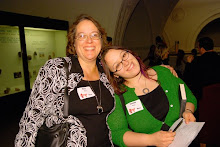Last night was the kickoff event for this summer's fellows at Yeshivat Hadar. It was a great event, with some wonderful study sessions and warm welcomes from a number of rabbis and guests. At the end of the event we davened Maariv, and though there were well over a hundred guests from a variety of age brackets, I happened to be the only person saying Kaddish.
This happens more rarely than I would expect. In the morning I tend to daven Shacharit at a Conservative shul where more than half of the crowd is in avelut. For mincha and maariv I'm usually at Orthodox shuls with a decent sized crowd, and at least a handful of guys saying Kaddish. But on Shabbat at Kehilat Hadar, and last night, and the yeshiva's inauguration, it's just me.
There is something terrifying and horribly sad about this. It is an inescapable moment of declaring my grief to a room full of people, many of them strangers. Though I've come to have a grim familiarity with my misery this year, rarely do I feel the words of Kaddish really move me. Their meaning is infamously not about death or bereavement, and the Aramaic, though familiar to me in some ways, still sets up a barrier between my recitation and a true internalization of what I'm saying. But when I am speaking alone, the words loom huge and intimidating before me. The responsibility seems heavier, more poignant, when there's no one else around in similar straits.
It is at moments like this that I miss my mother the most. She had many talents, but making people feel less alone, whether that was through welcoming people into our home, visiting the sick, or generally reaching out to people she knew were having a hard time, was an area where she was noticeably effective and strong. Walking home last night I thought about how much I wished I could call her and tell her how hard this year of saying Kaddish has been, and how disappointed I've been in my own traditions.
In a way, it's good to have these startling and solitary Kaddish experiences every once and a while, because they infuse the experience with a meaning that I often feel is missing. But then, when those moments arrive it is shockingly overwhelming. One moment I'm fine, and the next I'm drowning in this feeling of being totally alone and set apart from a room full of people.
We all have this feeling every once in a while, it's not exclusive to grief, but it's one that I think we feel more acutely when we are grieving.
In James Joyce's famous short story "The Dead" the protagonist, Gabriel, finds out at the end of the story that his wife Gretta was in love with a young man who died many years before. Gretta is reminded of her old love because of a song she hears at a party she and Gabriel attend together. Just as they are leaving the party one of the guests begins to sing The Lass of Aughrim, and Gretta suddenly gets a gleam in her eye, and color in her cheeks. Gabriel thinks she's in the mood for love, but back at their hotel he finds out she was grieving, thinking about her old beau, Michael Furey.
The story focuses on Gabriel and his experience, but this morning I reread and for the first time sympathized with Gretta. The Lass of Aughrim was her Kaddish, and there she was at a party and suddenly this song comes up and she's the only one in the room who knows how meaningful it is.
Joyce doesn't seem particularly interested in Gretta at the end of The Dead. He focuses on Gabriel, who has this sudden moment of realizing how insignificant he is and can be in the world. All night he's been singularly self-absorbed, and then he hears this story about his wife's past and he realizes that it's not all about him--that other people have loved and lost while he was mired in his own world. In the penultimate paragraph Joyce writes, "His soul had approached that region where dwell the vast hosts of the dead. He was conscious of, but could not apprehend, their wayward and flickering existence. His own identity was fading out into a grey impalpable world: the solid world itself, which these dead had one time reared and lived in, was dissolving and dwindling."
Though I dread the moments of being the only person in the room who is saying Kaddish, I also hope that by standing up there alone, saying the ancient words that mean my mother is gone, that there's someone sitting in the room who is shocked into thinking about all the devastating losses that everyone experiences all over the world. I hope someone is inspired to be a bit more sympathetic, to a deeper level of perspective and compassion. Because as the year wears on I've become more and more aware of how much loss is stacked up around us every day, and how each of us has suffered in ways no one else will really understand.




1 comment:
Tamar,
The last sentence of your most recent entry meant a great deal to me. I think your mom would be very proud of your having achieved this level of understanding.
I hope you are well.
Ann in AZ
Post a Comment